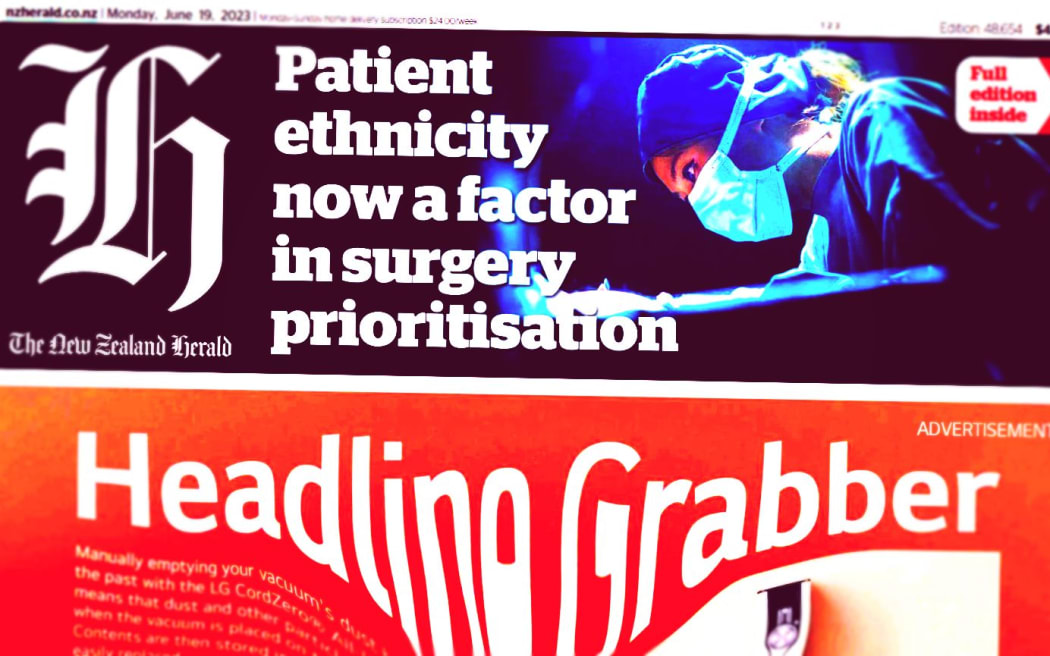- Joined
- Feb 26, 2019
- Messages
- 12,449
- Points
- 113
Surgery scoop sparks rows over equality and equity
From Mediawatch, 9:10 am on 25 June 2023
Colin Peacock, Mediawatch Presenter
@MediawatchNZ [email protected]
A scoop revealing that ethnicity is factored into Auckland-region surgery waiting lists sparked strong reactions against ‘race-based healthcare’ and claims that Māori and Pacific patients were “getting to the front of the surgery queue.”
But it turned out to be nothing new - and the formula might actually mean patients’ ethnic background has less impact on waitlist positioning.

The New Zealand Herald's front page reveals the Auckland surgery waiting list policy on Monday. Photo: New Zealand Herald
“Auckland surgeons are sounding the alarm over a new equity index-based waiting lists that critics are labeling divisive,” Newstalk ZB’s news at 5am declared on Monday, leading with a scoop from its political journalists Jason Walls and Barry Soper.
“The new system uses five categories to place patients on a medical waitlist, including clinical priority, time, speed, waiting location and deprivation level. But it's the fifth category - ethnicity - that's raised concerns,” Newstalk ZB reported.
That scoop also filled the front page of its stablemate, the New Zealand Herald under the heading: 'Surgeons express unease at new scoring tool, describing it as ethically challenging'.
The concern of those unnamed Auckland surgeons quickly kicked off a bigger political debate about ‘race-based health’ care. By 10am, the National Party had declared “Race Has No Place In Surgical Decisions.” ACT launched a campaign to “end race-based waitlists.”
By the end of the day, the PM had said he had asked his health minister to take another look at the policy.
The Equity Adjuster Score (EAS) aims to reduce inequity by re-prioritising patients according to a balance of those five factors. Māori and Pasifika were top of the ethnicity list, while European New Zealanders and other ethnicities were lower-ranked, they said.
But it was only ethnicity ZB’s listeners were hearing about.
“Māori and Pacific Islanders waiting for surgery are being moved to the top of the very lengthy hospital waiting lists,” Early Edition host Kate Hawkesby told her listeners shortly after the news broke.
She was echoing the news story on the Newstalk ZB website under the headline: ‘Auckland surgeons are being dictated to on ethnicity grounds over who should go under the knife first’.
Later that was changed to ‘Auckland surgeons must now consider ethnicity in prioritising patients for operations’ - because the EAS doesn't move people to the top of waiting lists on ethnicity alone.
The story also said some surgeons, who spoke on condition of anonymity, said the EAS was medically indefensible.
“There is no place for elitism in medicine. And the medical fraternity in this country is disturbed by these developments,” one told the Herald.
The Herald story also quoted the EAS’s backers - including Health Minister Ayesha Verrall and Sir Colin Tukoitonga. Te Whatu Ora’s Dr. Mike Shephard also told Newstalk ZB on Monday “ethnicity is not the only element considered in the scoring system.”
General practice New Zealand Chair Dr. Bryan Betty told Kate Hawkesby ethnic prioritisation was already deployed for immunisations for flu for Māori and Pasifika at a younger age.
But before they'd heard context like that, early risers hearing that Māori and Pacific patients were “getting to the front of the surgery queue” fired off angry text messages to Hawkesby.
“The person who leaked the medical apartheid should get a medal. What else is this racist government hiding in other areas,” said one Hawkesby read out on air within minutes of the news breaking.
“Preposterous to have an apartheid system based on race. This is New Zealand democracy dismantled,” said another.
“I have Māori heritage. I have not used it before but hearing this news this morning, I will use it. It is totally racist,” said another.
There were plenty more they came from.
Being in the top-ranked ethnicity in the EAS doesn't necessarily mean being at the front of the queue for surgery, but ZB listeners were hearing the opposite from the hosts.
“If you are Māori you go to the front of the queue,” Mike Hosking told his ZB listeners when opening his show at 6 am.
But later in his breakfast show, Dr. Mike Shephard told him Māori and Pacific patients “might only get one or two extra points out of 100 on that score because of their ethnicity” and clinical need was still the main driver.
“If they feel others have been prioritised over them because of race - whether it's true or not - that's going to make people extremely unhappy, and in some cases angry,” Kerre Woodham told her ZB listeners last that same morning.
It wasn’t hard to work out how ZB listeners got that idea.
In jest, she also told listeners she’d kept three lines free for Māori talkback callers only. Some didn’t get the joke.
Later, in an interview with National’s health spokesperson Dr. Shane Reti, Woodham admitted she'd misunderstood the balance of factors in the EAS.
“I assumed all the factors would be given equal weighting. But that's a very good point you make that some of the factors might be taken more into consideration than others,” she told Dr Reti.
Setting the record straight
On Monday afternoon, the Herald’s website published a much-needed explainer by its reporter Nicholas Jones (also in the paper on Tuesday) which showed the issue at the heart of ZB’s scoop was not new.Auckland District Health Board had used ethnicity prioritisation since 2020, working through waiting lists swelled by COVID-19 disruption. Other DHBs followed suit - and Nicholas Jones didn't exactly bury the lede when he wrote all about it for the Herald at that time under the headline, 'Which DHBs could prioritize Māori and Pacific patients'.
Stuff reported the move in the Wellington region in May 2020 after the CCDBH went public in a media statement:
The Herald’s Nicholas Jones reported the change was embedded by Te Whatu Ora a year ago after a Health Quality and Safety Commission investigation in 2019 challenged health services to stamp out institutional racism.“Capital & Coast and Hutt Valley DHBs are prioritising Māori and Pacific in our surgical scheduling processes. The patients’ ethnicity is taken into account along with their level of clinical urgency and the number of days they have been on the waiting list within a given clinical priority band. It is unlikely that any other patients will be significantly affected as a result of this work.” - media statement, May 2020
Nicholas Jones also pointed to other research into health service inequities that prompted the EAS in the first place.
“Priority must be given to excessively long waiting patients with emphasis on the longest waiting Māori and Pacific patients. Initiatives must be put in place to resolve this,” a government task force on surgery backlogs concluded.
And some of those initiatives were also reported elsewhere in the news at the time - without controversy.
Radio Waatea reported in August 2022 that Whatu Ora Taitokerau was working with Counties Manukau, Waitematā and Te Toka Tumai-a Auckland to clear waiting lists.
“We’ve reviewed all our Māori and Pacific patients who’ve been waiting longer than 320 days in Te Tai Tokerau. This will mean some patients will need to travel to other hospitals . . . and in some cases, we will be bringing clinical teams up here,” interim director Tracey Schiebli said.
Sharpening a blunt instrument?
This week, Newsroom’s political editor Jo Moir pointed out that the EAS was also a response to concerns that social deprivation, geographical location also needed to be included - as well as time on the waiting lists.
So until February this year, ethnicity had been one of just two factors - and the adoption EAS may actually reduce the impact of ethnicity on surgery prioritisations.One of the EAS’s creators Duncan Bliss told Jo Moir clinical need always took precedence, “and the EAS doesn't interfere with that.”
“The EAS is designed from a health perspective, not a political one,” he told Jo Moir, who later wondered whether there would have been no controversy at all if ‘life expectancy’ had been listed as a factor instead of ethnicity.
Jo Moir later told The Detail she expected any decision on nationwide adoption of the EAS would have to wait until after the election.
“Partisan media and political spin doctors (the worst kind of doctors) have elected to land a few points in the lead up to October's election,” Whakaata Māori ’s Will Trafford wrote this week, under the headline ‘Under the knife’ fight.
The Herald and Newstalk ZB would doubtless reject the ‘partisan’ tag, and claim to have brought to light something of public interest which - while not exactly secret -had been obscured by medical bureaucracy.
But the same day they kicked off the political debate about ‘race-based healthcare,’ the Waitangi Tribunal’s Health Services and Outcomes Inquiry resumed hearing grievances relating to health services for Māori .
There has been a long waiting list for those to be addressed as well. The WAI 2109 claim was lodged by Maaka Tibble in August 2008.
There was not so much coverage of that in the news this past week, but plenty about the differences between those who believe in a one-size-should-fit-all equality in health - and those who say real equality requires equity, which interventions like the EAS might help to deliver.

